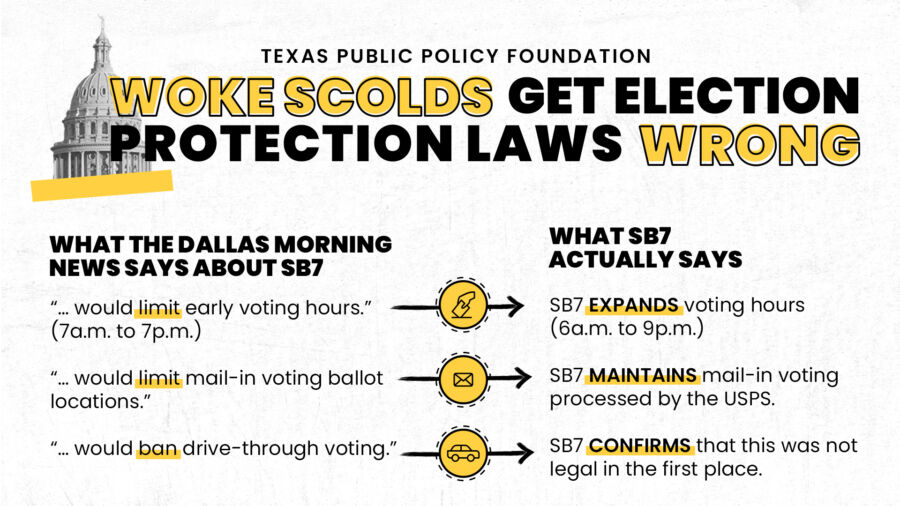There’s a very telling subhead in the Dallas Morning News story on “backlash” to election protection laws: “If bills are viewed as discriminatory, Texas could lose NCAA and professional sporting events.”
The Morning News isn’t wrong (about that, at least); it’s not about whether proposals such as Senate Bill 7 actually are discriminatory; it’s about perceptions. What the woke scolds in the corporate world, such as American Airlines, Dell and Major League Baseball, get completely wrong is that Texans want secure elections—and that their performative threats don’t scare us at all.
The corporations are also misreading their customer bases.
“The data clearly shows that 87–92% of Americans don’t want corporations and athletes preaching woke politics,” says Phillip Stutts, founder and CEO of Win Big Media, which studies political marketing. “You aren’t crazy for wanting to watch games and be distracted in these weird times, instead of being told how bad a person you are for not agreeing with a ‘woke’ reporter or athlete’s opinion.”
(For that matter, corporations aren’t even pleasing their presumed woke audiences; Colin Kaepernick is still not satisfied with the NFL’s dedication to the Black Lives Matter movement, for example.)
But back to the Dallas Morning News. This is the newspaper that published a shockingly inaccurate report on Senate Bill 7, claiming that the legislation would “make it harder to vote.” It literally does the opposite.
What it does is limit the powers of local elections officials from making up new rules and processes—something that’s clearly and constitutionally the role of the Texas Legislature. The bill doesn’t take away anything. It simply stops the extralegal measures that officials in Harris County (especially) and other locales enacted under the guise of COVID-19 response. Those measures (even ones not enacted) then become the new normal, and anything less is portrayed as voter suppression.
The Morning News complained that the bill “would limit early voting hours.” The opposite is true. The Texas Election Code sets out voter hours, which are currently 7 a.m. to 7 p.m. The bill expands them to 6 a.m. to 9 p.m. The newspaper adds that it would also limit mail-in ballot drop-off locations. First, there’s a drop-off location at every home: It’s called a mail-in ballot for a reason. The chain of custody of these ballots through the USPS has been tested over time and there’s no reason to change that. And finally, it bans drive-through voting—which the bill’s author, Sen. Bryan Hughes, notes has never been allowed and therefore never been made secure.

If Texas Democrats want to allow for these changes in our voting rules, they can write the bills and try to convince their fellow lawmakers these are good ideas. That’s the way you change election policies and the Texas Election Code. You don’t simply set aside the law and the U.S. Constitution, as these woke corporations want us to do.
But those Texas Democrats will find that the public isn’t behind them. Texans want to be sure our elections are free and fair.
Currently, Texas requires voters to show a valid government-issued ID to vote in person, but they need only a signature and no identification to vote by mail. Nor do they have to prove they’re disabled or otherwise qualify for a mail-in ballot. More than four out of five (81%) of Texans said in our recent poll that voting in person and by mail should have the same voter identification requirements.
Additionally, 60% of Texans believe vote-by-mail should be available only to citizens who are elderly, disabled, away from their primary residence for work, or serving in the military. While SB 7 initially contained a provision that would enforce this by requiring documentation, but that was stripped out of the bill at the last minute. That amendment was offered by Democratic Sen. Judith Zaffirini.
The Dell Corporation issued a statement when SB 7 was passed by the Texas Senate last week: “Instead of seeking to limit access, governments should provide innovative pathways for citizens to have their voices heard.”
The truth is that every fraudulent ballot cast silences the voice of an eligible Texas voter. That’s where our focus should be.
It’s a perception problem, all right. But Texans won’t allow woke corporations with purchased platforms to misconstrue legislation and mislead the public. Secure elections are the right of every Texas voter, and lawmakers have a duty to them—not to the insufferable scolds of the corporate world.